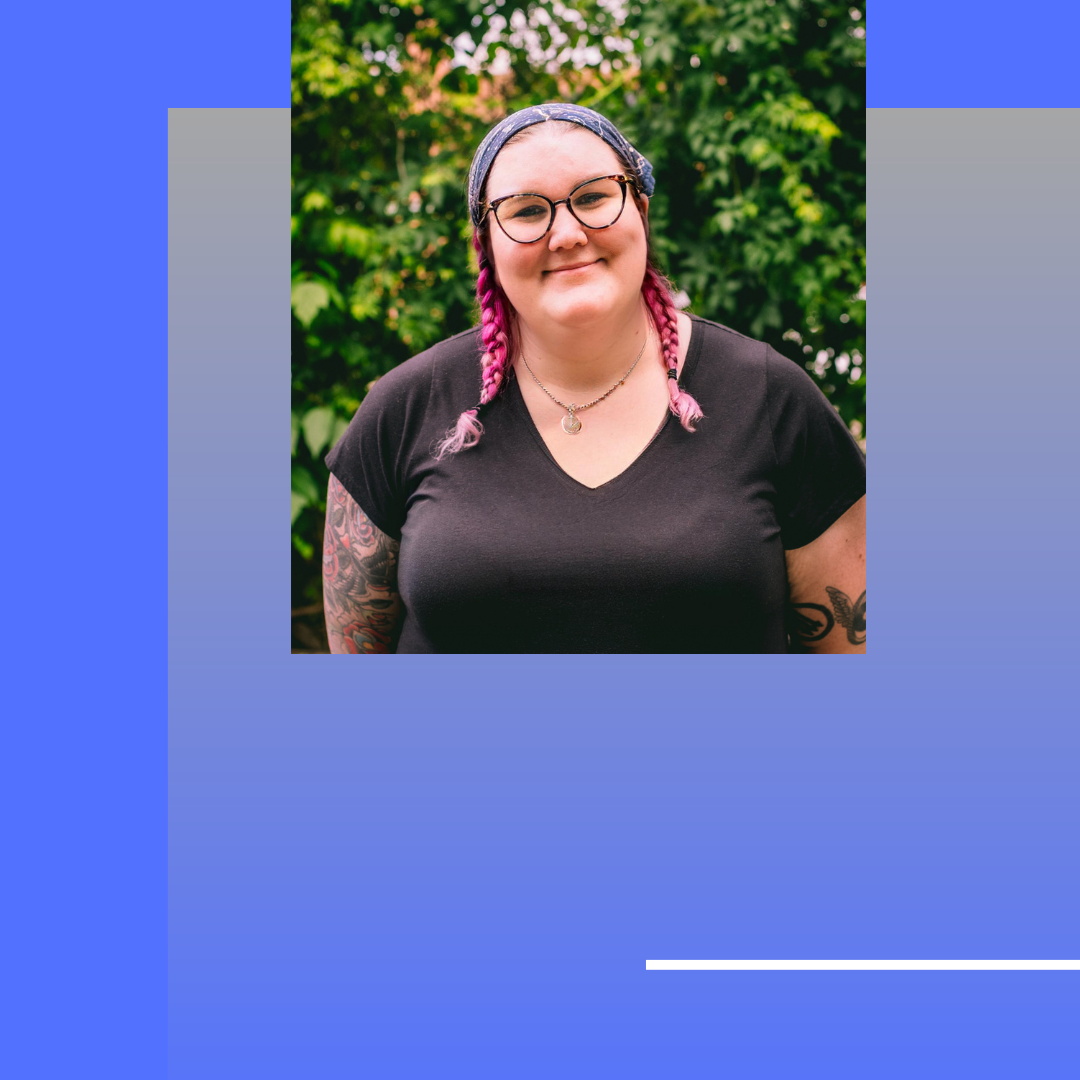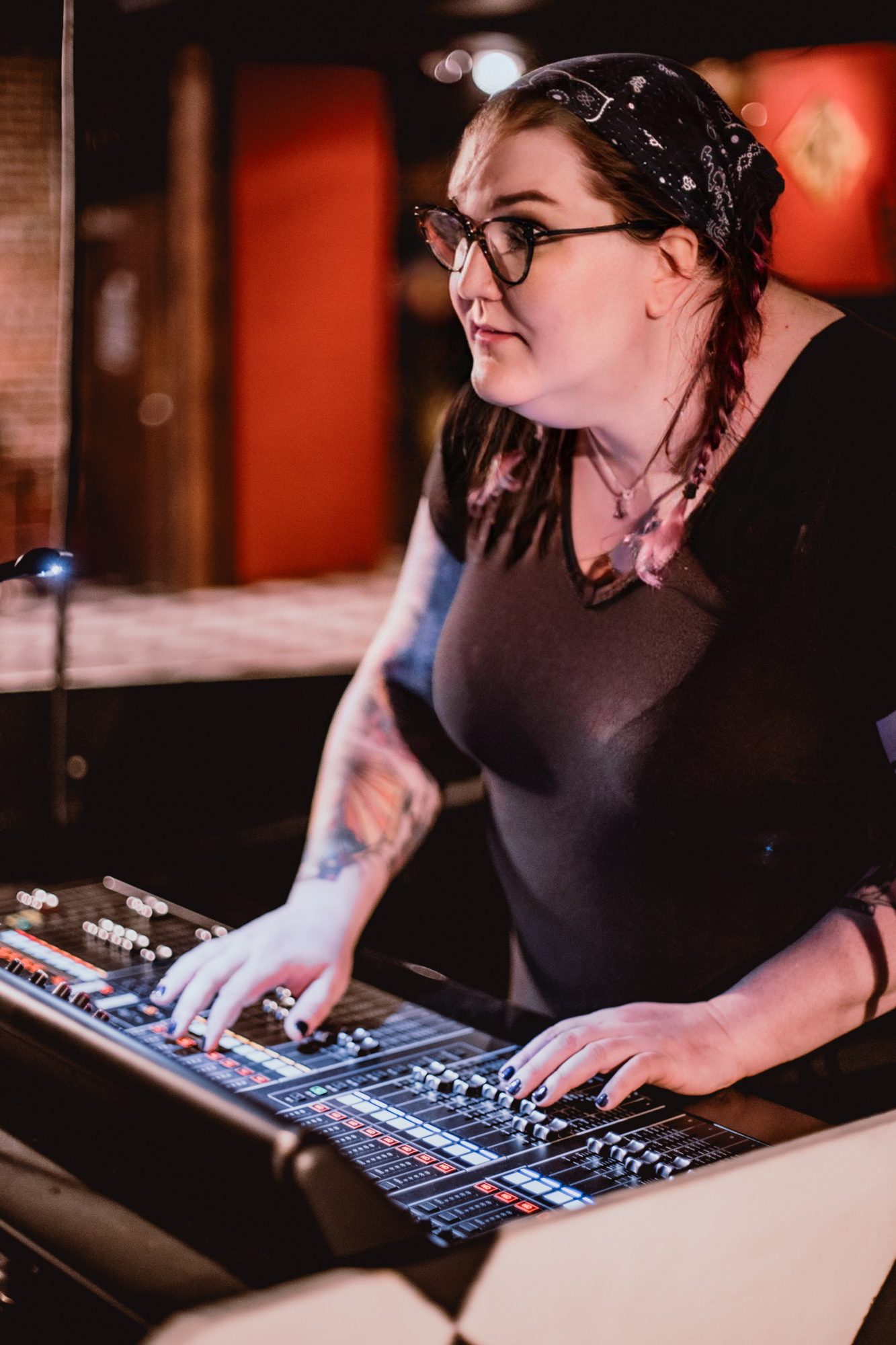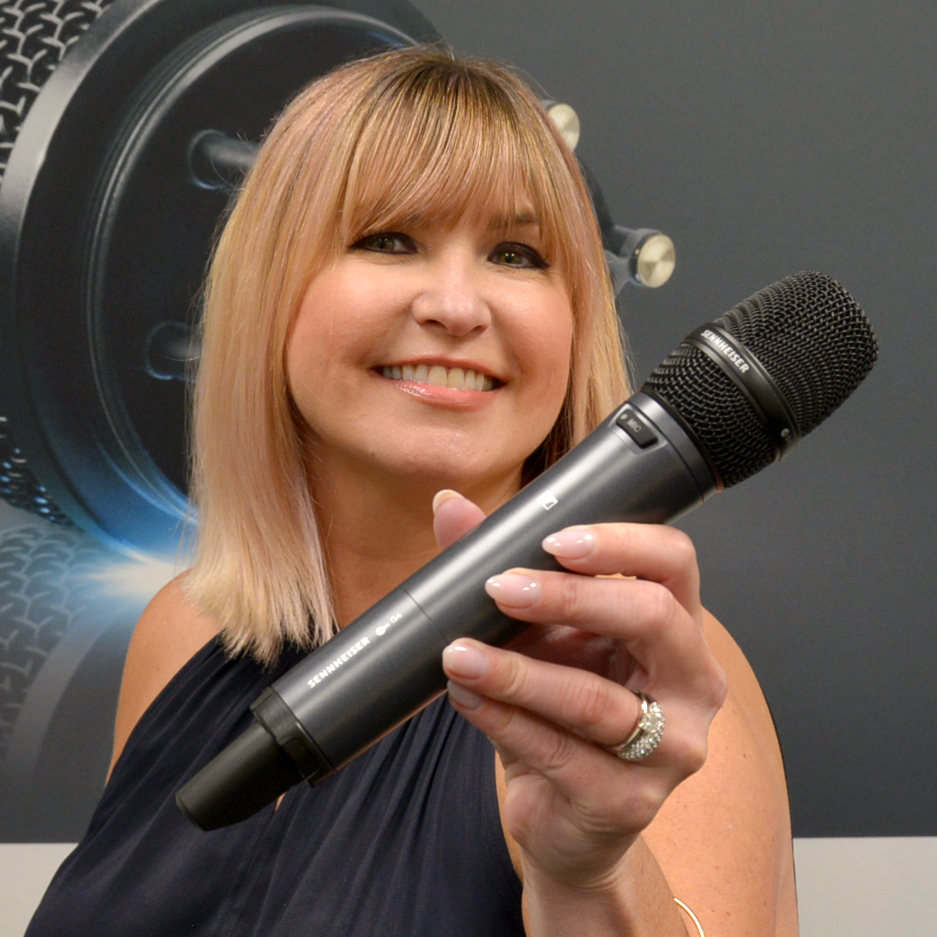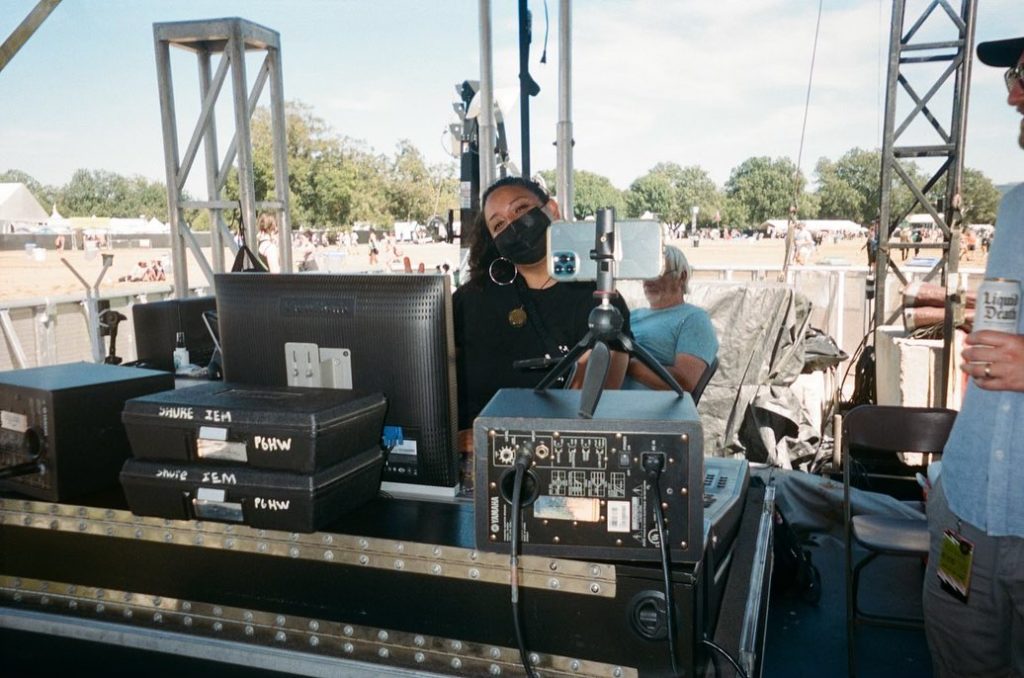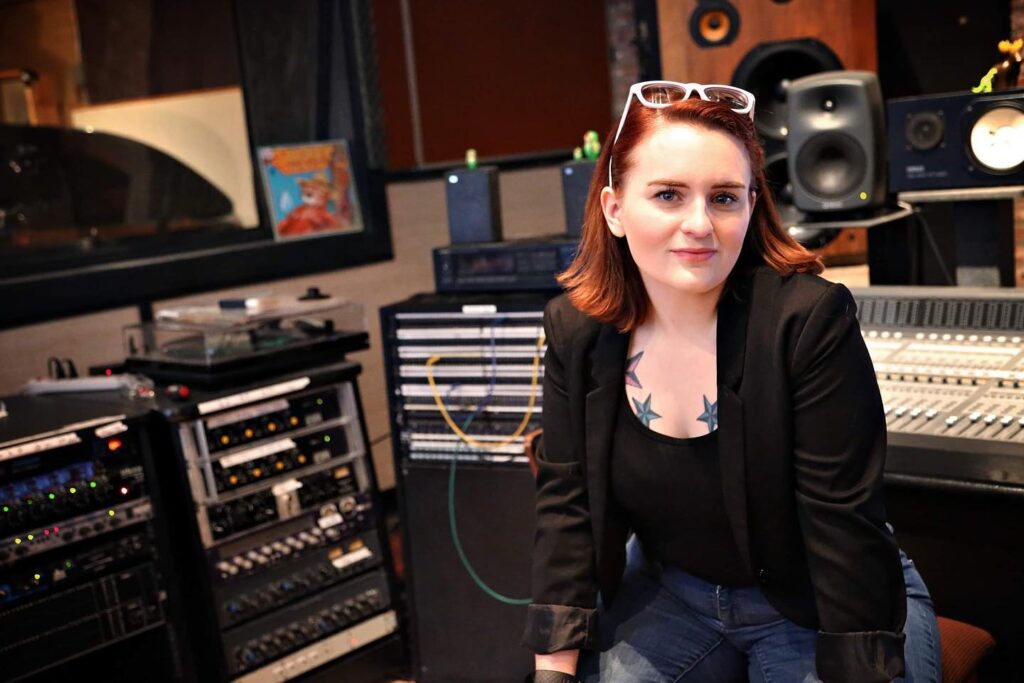Kitzy is an independent touring FOH (Front of House) Engineer and Production Manager based in Philadelphia, has been immersed in the world of audio for over 20 years. In addition to owning a small audio production and rental company, Kitzy dabbles in studio work and podcasting.
Their journey began in the early 2000s, organizing punk shows in a firehall in central Pennsylvania, using a second-hand PA system. Reflecting on those days, Kitzy notes, “Audio wasn’t really the focus, but more of a means to an end. I thought I wanted to be a promoter, but in reality, I think I just wanted an excuse to put my band on shows.”
During the early to mid-2000s, Kitzy toured with various bands, experimenting with digital recording—again, primarily as a way to support their own band’s music rather than as a central career goal. However, in 2010, after their band dissolved, Kitzy found themselves at a crossroads. With family and personal pressure to find a “real job,” they set aside their musical ambitions, entering the tech industry and climbing the corporate ladder.
By 2015, Kitzy had relocated to San Francisco for work. While there, they reconnected with a former bandmate, reigniting their passion for music. This time, Kitzy delved deeply into recording and producing, benefiting from the wealth of free educational resources available on YouTube. “I realized how much I had been missing working on music,” Kitzy recalls. Despite their growing knowledge, the tech world and life in San Francisco left them unfulfilled, prompting thoughts of a new chapter.
In their search for inspiration, Kitzy discovered Weathervane Music and its Shaking Through series, which sparked their desire to return to music production. With Philadelphia’s vibrant music scene and proximity to family, Kitzy saw it as the ideal location to start over.
In 2017, Kitzy moved to Philadelphia, where they built connections within the local music scene, attending workshops, shows, and eventually forming a new band. They recorded and released an album, and things seemed to be falling into place. Kitzy also bought a house and built a home studio, intending to focus on producing records. But the pandemic in 2020 disrupted these plans.
Undeterred, Kitzy adapted by launching a podcast with a friend, centered on independent music. They also invited bands to perform live streams in their studio, which marked Kitzy’s first significant experience mixing live performances. This work sparked a new passion: capturing live music as an integral part of the performance. Kitzy found the dynamic immediacy of live mixing deeply fulfilling.
By 2022, with live events returning, a band that had participated in the live streams invited Kitzy to mix their shows on the road. Kitzy vividly remembers the thrill of their first live show: “The power under my fingertips was like nothing else I had ever felt before. When the band hit their first note, I knew that this was what I wanted to do more than anything else in the world.” Since that pivotal moment, Kitzy has been pursuing live sound engineering with an unrelenting passion, rediscovering their love for live music with every performance.
Early Life
When did you discover audio as a career path?
It’s really only the last couple years I’ve been taking it seriously as a career path. I spent my whole life being told that I can’t make a living in music and that I need to get a “real” job.
Did music and audio interest you while you were growing up?
I’ve been obsessed with music, and by extension audio, ever since I can remember. A lot of my early music taste was a direct result of the stuff my mom was listening to, like R.E.M., The B-52s, Yes, James Taylor – stuff like that. My grandmother also had an influence on my music taste early on. She would play stuff like The Beach Boys, Jimmy Buffet, and Cliff Richard.
My mom would take me to the local video rental store once a week and we’d rent a movie to watch together. They had a small shelf of music related videos, and there were two that I made my mom rent so many times that she probably could have bought them several times over: R.E.M.’s Road Movie and Yes’ 9012Live. If you’ve never seen 9012Live, I highly suggest you track down a copy. The concert footage is inexplicably intercut with colorized footage from a 1950’s Edison Electric film for some reason and the visuals are truly bizarre.
I remember getting a karaoke machine one year for Christmas. It had a pair of microphones, and two tape decks. I think the intention was that you could play the karaoke version of a song and record yourself singing over it, but I quickly figured out that I could record my own music and then overdub myself playing and singing along with it. I was convinced I had invented this and that no one else knew this incredible secret.
In high school, I graduated to a Tascam 4 track tape machine, and I remember being amazed that I could change the volume of the things I was overdubbing AFTER I recorded them. With the karaoke machine, I had to get the volume balance right while I was recording. But now, I had the power to get the mix just right. It felt like magic.
Career Start
Did you have a mentor or someone that really helped you?
Brian McTear was a great mentor when I moved to Philly and thought my future was purely studio work, and continues to be a sounding board for me to this day.
I never really had a live sound mentor, but I’ve been lucky enough to form friendships with some other up and coming live engineers who are an amazing support system.
Career Now
What is a typical day like?
Every tour is a little different, but I’ll use my most recent tour as an example.
Wake up in a hotel room around 8AM, pack up my stuff and head to the van for an 8:30 van call. I’m sharing driving duties with the tour manager on this run, and she prefers driving later in the day, so I’ll typically take the first shift. We stop for breakfast somewhere and then it’s anywhere between a 3 and 5 hour drive to the next city.
Halfway through the drive, I switch off with the TM. I’ll use this time to catch up on a little more sleep, review the parking and load in instructions for the venue we’re heading to, read over their tech pack, etc. I’ll also bounce the recording from last night’s show and upload it to Google Drive for the band to review if they want. As I’m listening through, I’ll make myself a few notes of things I want to try differently tonight.
We get to the venue early afternoon and unload the trailer. It’s a self-contained tour, so we’re carrying backline, our own console, IEMs, and mic package, and a lighting ground package. We also have a few set pieces. As the FOH engineer and defacto Production Manager on this tour, I’m responsible for all of it. I get my big items placed on stage first, and then work on setting up FOH while the band sets up their backline.
If I have time, I’ll put up a few measurement mics and verify the PA with Smaart, and try to get the tonality of the PA close to my target curve. Then I walk the room with my reference playlist and make sure it sounds good.
If I don’t have time, I throw on some music and EQ the system by ear.
Then I move on to micing and patching the stage, and I’ll do a line check with my iPad. If I have time, I’ll pull up the multitracks from last night’s show in a virtual soundcheck and see how the room sounds. I’ll also go on stage and listen to each musician’s IEM mix while standing/sitting in their spot to see how it sounds for them. I might make some minor adjustments to their mix here if something obvious sticks out to me.
Then I bring the band on stage for sound check. My FOH mix is pretty dialed at this point, and the room is going to sound different once we fill it up with people anyway, so my main focus here is to make sure everything is working (i.e., that the timecode from the playback rig is firing our lighting cues and console automation) and that the band is comfortable with their IEM mixes. Once the band is happy, I bring the principal artist out and we run through whatever she wants to run through. Once she’s happy, we end sound check.
We have an opener on this tour that I’m not handling production for, so I’ll strike our front line to make room for the opener and hand things off to the house crew. At this point, I swap the batteries in all of our IEMs and RF mics/packs with freshly charged batteries. I deliver the IEM packs to the green rooms so that the band knows where to find them before the show.
I’ll use the time between sound check and our set to eat dinner, take a nap, answer emails, and if the venue has a shower I will probably take a shower. At the very least I’ll put on a fresh pair of socks. Something about a fresh pair of socks really makes a world of difference.
In the changeover before our set, I re-set our front line, tune the principal artist’s guitar, and line check EVERYTHING. I send the console’s listen bus to my IEM pack, and I use my iPad PFL each channel one by one with my IEMs in and make sure I’m getting the sound that I expect. I even check that the timecode channel sounds like timecode. I always do this from the stage so that if there’s an issue that needs to be addressed, I’m already there.
Then it’s showtime. Perhaps counterintuitively, I’m doing the least amount of work during the actual show. This is a pop tour with backing tracks, so the same things happen at the same time every night. I’ve automated most of my moves throughout the show, like muting the acoustic guitar when it’s not being played, and boosting the electric guitar during the big solo. I’m just there to make sure nothing catches on fire, and I get to enjoy the show.
Once the show is over, I’m in a race with our merch manager to see if I can get all of our production packed up and loaded into the trailer before she has merch packed and loaded. I do not know if she is aware of this race.
Once the trailer is packed, we head for the hotel for the night and get ready to start the process all over again.
How do you stay organized and focused?
Early on, I would get super overwhelmed with everything that I had to do, especially during set up and strike. I’ve found that the best way to combat this is to just focus on the next thing I need to do. I don’t worry about needing to strike the entire stage, I just focus on collecting all of the microphones and putting them in their case. Once that case is packed, I move on to the next one. Rinse and repeat until I look up and everything is packed.
Whenever I’m in the moment, I’m only focusing on the next thing that I need to do. I trust my planning, my prep work, and my team around me, that things won’t go too off the rails if I’m not constantly stressing over every little thing that hasn’t happened yet.
What do you enjoy the most about your job?
I love when a band is really locked in and playing well to a room full of people who are enjoying every moment. I love knowing that I’m a small part of making that happen.
What do you like least?
Chasing people down to pay my invoices.
If you tour what do you like best?
I love traveling and seeing new cities every day. I love working in new venues with new people. I love seeing how a show changes and develops over the course of a tour.
What do you like least?
How long the days are, how little sleep I get, and when house crews are shitty to me because I don’t fit their expectations of who a sound engineer should be. I also hate the grind of always having to figure out what my next tour is.
Oh and being away from my dog.
What is your favorite day off activity?
Sleep.
What are your long term goals
I’d love to have a long, sustainable career with a small handful of artists who are doing well, where I’m making enough money that I don’t have to stress about it.
I’d also love to get to a point where I’m not driving, and have enough of a production budget to hire a crew so I’m not doing everything alone. That sounds really nice.
I’d still like to work on records in my downtime between tours as well.
Oh, and I really want to mix a show at Red Rocks.
What if any obstacles or barriers have you faced?
Being both transgender and autistic has been a barrier, not in my ability to do my job well, but in other people’s ability to see my value. That said, I have been coming across a lot more neurodivergent people in the industry lately and it’s been so refreshing to be around other people with brains like mine.
I think the biggest obstacle I’ve faced has just been finding consistent work. All of the artists I work with are on really tight budgets, so even if I do a tour with an artist and they want to work with me again, there’s no guarantee that they’ll have the budget to hire me on the next tour.
I think I’m in a weird spot since I started my live sound journey so late in life. Because my live sound resume only goes back a few years, I get a lot of absurd offers like $500-700/wk, which would be fine if it was 2005 and I lived with my parents and was on their health insurance, but that’s not my reality. I know that this is an industry where you need to grind and work your way up, but I’m still trying to figure out how to survive while doing that.
How have you dealt with them?
I’m still figuring that out. I’ve been focusing on networking, making as many connections as possible, and putting myself out there as much as I can.
Advice you have for women who wish to enter the field?
If you love it, do it. Keep doing it. Don’t listen to anyone who tells you that you can’t. Find your tribe and then hold on for dear life.
Must have skills?
In my opinion, the actual audio engineering skills are only like 10% of it. They’re important, and you need them if you want to work in this industry, but I think that people skills, communication, organization, planning, delegation, and a positive attitude are more important and will take you a lot further than being the best mixer. At the end of the day, nobody cares what ratio your compressor is set to or what your reverb decay time is.
The people skills are probably the most important. The grumpy, bitter, and jaded sound tech stereotype exists for a reason. I don’t care how good of an engineer someone is, if they’re an asshole, I don’t want to work with them.
Favorite gear?
The Beyerdynamic M 201 is the GOAT on snare.
